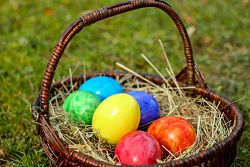

Easter Sunday is this weekend (20 April), which is a festival in the Christian calendar that celebrates Jesus rising from the dead, three days after he was crucified.
Easter eggs are used as a symbol for the resurrection of Jesus. Nowadays, most Easter eggs are made from chocolate and covered in coloured foil, but traditionally chicken eggs would be hard boiled and then decorated by hand.
Easter can also include the following traditional activities:
Although Easter can be a fun and wholesome time of the year, it can be a time that increases waste due to packaging and excess food, so here are some ways to have a cracking but environmentally friendly, Easter.
Easter eggs
Easter would not be the same without delicious chocolate eggs, but many come wrapped in excessive plastic packaging.
In the UK, we collectively buy approximately over 90 million boxed chocolate eggs a year, and it is estimated that the packaging surrounding your Easter egg makes up a third of the total weight of a boxed Easter egg.
To reduce waste without sacrificing Easter enjoyment, choose Easter eggs with minimal or recyclable packaging: some supermarkets now offer low-waste Easter eggs, or independent shops that sell Easter treats without the packaging.
You could also make your own Easter treats, using egg-shaped molds which can then be a fun activity!
If you do receive an Easter Egg in plastic packaging make sure to dispose of it correctly, and recycle the appropriate materials.
If you get a choice of your Easter egg, try to opt for a dark chocolate or chocolate made with plant-based alternatives, as they have a smaller carbon footprint.
Easter decorations and cards
Shop-bought decorations are not the only way to brighten up your home for Easter!
Make a new tradition and get creative whilst reducing waste by making your own decorations from reusable and recyclable materials such as scrap paper, old magazines, fabric scraps, old clothes and paints.
When it comes to egg decorating, try using natural dyes from fruits, vegetables and spices, and get the whole family involved. When you are finished with your eggs, if you don't fancy eating all of them, you can compost them, as long as they are decorated using eco-friendly dyes.
If you like to send Easter cards to celebrate the occasion, try to buy cards that can be recycled. Cards that have excessive glitter, or ribbon and bows stuck onto them cannot be accepted.
Avoid cards with glitter, bows and ribbons, and cards with electronics (such as music or lights) and look for FSC labelled cards sourced from sustainably managed forests, or which have a high recycled content.
Egg hunts
Easter egg hunts are fun at any age, but this year, why not try ditch the disposable plastic basket for your egg hunt and choose a more sustainable option.
Try decorating a container you already own or a shoe-box with spring flowers and your DIY decorations. Or find a second-hand basket online.
If you usually hunt for plastic treat-filled eggs instead of chocolate, swap these for reusable wooden or fabric eggs. You could even:
Food waste
Food can be a big part of Easter traditions, whether that is your hot-cross buns for breakfast, fish and chips on Good Friday, or the roast dinner Easter Sunday.
Though delicious, these traditions can generate a lot of food waste if not planned carefully. To minimise waste, plan your menu in advance and only buy what you need.
Also, remember to store leftovers in reusable containers and search for recipes to use them up, and consider plant-based alternatives instead of traditional roast meats.